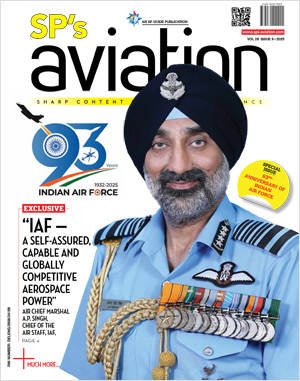INDIAN ARMED FORCES CHIEFS ON OUR RELENTLESS AND FOCUSED PUBLISHING EFFORTS

The insightful articles, inspiring narrations and analytical perspectives presented by the Editorial Team, establish an alluring connect with the reader. My compliments and best wishes to SP Guide Publications.

"Over the past 60 years, the growth of SP Guide Publications has mirrored the rising stature of Indian Navy. Its well-researched and informative magazines on Defence and Aerospace sector have served to shape an educated opinion of our military personnel, policy makers and the public alike. I wish SP's Publication team continued success, fair winds and following seas in all future endeavour!"

Since, its inception in 1964, SP Guide Publications has consistently demonstrated commitment to high-quality journalism in the aerospace and defence sectors, earning a well-deserved reputation as Asia's largest media house in this domain. I wish SP Guide Publications continued success in its pursuit of excellence.
- A leap in Indian aviation: Prime Minister Modi inaugurates Safran's Global MRO Hub in Hyderabad, Calls It a Milestone
- All about HAMMER Smart Precision Guided Weapon in India — “BEL-Safran Collaboration”
- India, Germany deepen defence ties as High Defence Committee charts ambitious plan
- True strategic autonomy will come only when our code is as indigenous as our hardware: Rajnath Singh
- EXCLUSIVE: Manish Kumar Jha speaks with Air Marshal Ashutosh Dixit, Chief of Integrated Defence Staff (CISC) at Headquarters, Integrated Defence Staff (IDS)
- Experts Speak: G20 Summit: A Sign of Global Fracture
Interview - ‘Infrastructure Must Keep Pace’

General aviation has been the ‘quiet revolution’ of Indian aviation, says Captain (Retd) Pankaj Chopra, Vice President, Religare Aviation Limited. There are over 100 non-scheduled operators in India and the number is growing but the pace of infrastructure growth has been far from desirable. Fixed base operators—one of the key ingredients for a robust growth—is lagging behind. Pankaj Chopra in an interview with R. Chandrakanth.
SP’s Aviation (SP’s): Could you tell us briefly about Religare Voyages and the future plans, considering the growth of the general aviation (GA) sector?
Pankaj Chopra (Chopra): Religare has been the frontrunner in the charter business for many years now. From just one C-90 five years ago, we have progressed to a fleet of 12 aircraft which includes two helicopters. The mix of turboprops, jets and helicopters gives us extreme flexibility and we can cater to all types of business and operational requirements. We intend to develop this capability further and go into regions hitherto not serviced by air travel. Air Charter business is no longer limited to the corporate and political segment.
SP’s: What is the outlook for the general aviation industry in India?
Chopra: GA was the ‘quiet revolution’ of Indian aviation. It took place in tandem with the revolution in the airline business from 2004 onwards but got overshadowed by the latter. Nearly 150 aircraft have been imported into India under charter/private category in the last three-four years. There are 100 plus non-scheduled operators in India and the number is growing by the day. Nearly 200 more small aircraft will be inducted into India in the next three-four years. So the future is indeed bright, provided the infrastructure and other support keeps pace with the demand.
SP’s: As an operator, could you list out some of the challenges and what needs to be done?
Chopra: GA operations have significant differences from scheduled operations and need to be treated as such. A very tight squeeze as far as infrastructure availability at airports is concerned. Considering that nearly 200 aircraft are on order to the existing 200, enough space should be made available. The requirement of space is not only for parking but also hangarage, maintenance facilities, separate GA facilities at airports. Most aircraft being inducted are extremely sophisticated and expensive and require high standard facilities.
Non-scheduled/GA operators often fly to small and unused/uncontrolled airports/helipads. A lot of these airfields/landing strips do not have any published operational data. There is therefore an element of risk involved in operating to such places. There needs to be a comprehensive document published about information on all airfields in India.
All aviation regulations are basically airlines-centric and do not address a variety of issues typical to general aviation. There needs to be a separate body established to look into this very important issue. Rules and regulations need to be drafted/modified to cater to non-scheduled operations.
GA fraternity needs to be included into the various collective activities organised by the Ministry of Civil Aviation so that their issues get represented and resolved.
SP’s: Has the general aviation segment represented to the government on FBO and other requirements?
Chopra: No recognised body has been formed as yet which is authorised to represent all non-scheduled operators and take their concerns to various regulatory bodies. Hence the issues are either presented individually which doesn’t carry collective weight or not presented at all. This leaves gaps in both safety and efficiency of GA operations. Nevertheless, the regulators are seized of the need for separate facilities like FBOs and separate GA terminals. Hopefully, some action would soon start towards progressing these.
SP’s: Why is there a clamour for major airports which are already congested?
Chopra: GA sector clamours for metros because that is where basic facilities are available for them. Notwithstanding that, GA operations are best done from smaller satellite airfields the world over. If our smaller airfields offer adequate facilities for GA, operators would gladly move over to them and save significant costs.





